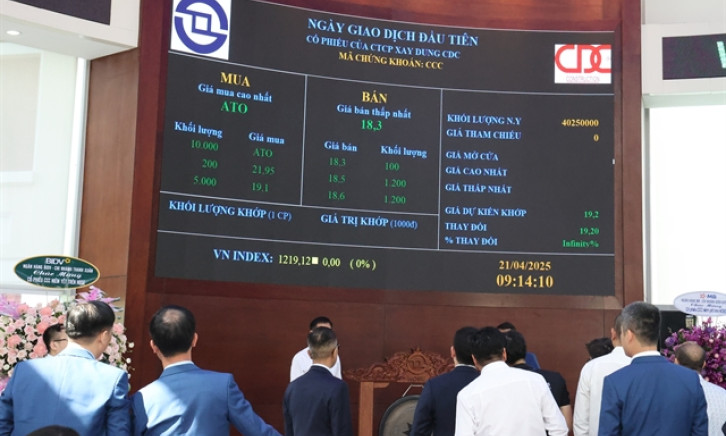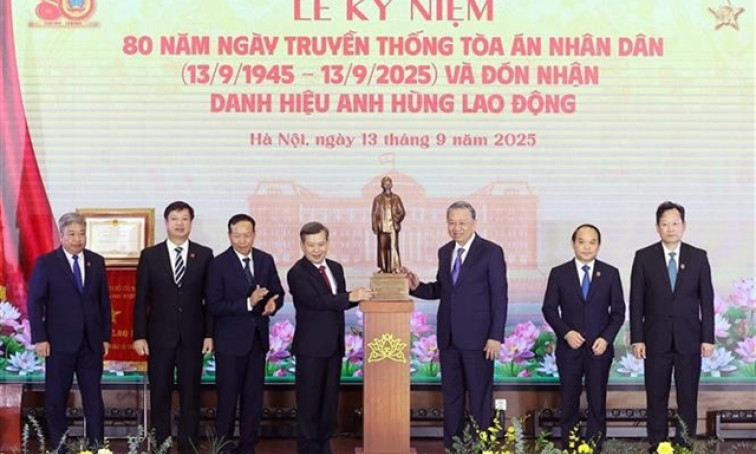E-commerce propels Vietnamese enterprises and brands globally
The Cross-border E-commerce Summit 2024 embraces digital trade as an opportune pathway to elevate Vietnamese enterprises and brands onto the global stage.
HÀ NỘI — The Cross-border E-commerce Summit 2024, which opened yesterday in Hà Nội, placed emphasis on a forward-thinking approach in embracing cross-border e-commerce as an opportune means to elevate Vietnamese enterprises and brands onto the global stage, thus reinforcing import-export activities.
The event, themed 'The Quintessence of Vietnamese Goods Soaring Globally,' was organised by Amazon Global Selling Vietnam (AGSV) in coordination with the Vietnam E-commerce and Digital Economy Agency (VEDEA) under the Ministry of Industry and Trade.
The forum also highlighted a series of promising outcomes, showing that the recent explosion of e-commerce has significantly supported Việt Nam's import-export activities.
Nguyễn Thị Minh Huyền, VEDEA’s Deputy Director, said that retail e-commerce turnover has grown at an average rate of about 20 per cent over the past decade, propelling Việt Nam into the ranks of the fastest-growing e-commerce markets in the region and the world.
The global e-commerce market is expected to grow rapidly, with estimated revenues reaching US$7.4 trillion by 2025. Against the backdrop of Việt Nam's deepening integration into the global economy, coupled with opportunities from new-generation free trade agreements, the trend of transitioning from traditional business to digital platforms is seen as an effective way for businesses to penetrate and expand into export markets, Huyền said.
The authority is implementing the National E-commerce Development Master Plan (2021-2025) to strengthen the e-commerce market and consumer trust, she said. Both promoting exports and boosting domestic consumption of local products through e-commerce are priorities. Currently, the agency is partnering with provincial authorities to enhance e-commerce management, support digital transformation, and promote local products on platforms like Sàn Việt.
Gijae Song, CEO of Amazon Global Selling Vietnam, said that in just the past five years, the number of products sold by Vietnamese partners on Amazon has increased by over 300 per cent, while the number of Vietnamese partner businesses achieving $1 million in revenue per year on Amazon has increased nearly tenfold.
Amazon’s Brand Registry programme has also seen 35 times more Vietnamese businesses participating in the same period.
Gijae pointed out some advantages for Vietnamese sellers, such as vibrant online seller communities and significant manufacturing advantages due to lower labour costs and high-quality outputs. However, he said Vietnamese manufacturers are predominantly set up for large-scale, pre-planned orders, making it difficult to adapt to the fast-changing demands of online retail. Additionally, while Vietnamese sellers are quick to seize short-term opportunities, many lack the experience and strategies for building long-term, sustainable businesses.
AGSV’s leader advised local businesses to focus on speed and customer needs. Successful e-commerce sellers need to rapidly incorporate customer feedback into their products and bring them to market quickly. A balanced approach combining rapid responsiveness with strategic planning is key to thriving in the competitive e-commerce landscape, he said.

Partnering with industry associations
ABSG unveiled Phase 2 of the 'Cross-border E-commerce: A Breakthrough Era' programme in collaboration with the Department of E-commerce and Digital Economy through the 'Industry Linkage — Growth with Cross-border E-commerce' initiative. This programme will aid collaboration between pivotal associations and industries to collectively boost and fortify cross-border e-commerce capabilities for leading export sectors. It aims to heighten awareness, furnish additional training resources, and assist member businesses to succeed in the realm of global e-commerce.
Ngô Sỹ Hoài, Vice Chairman and Secretary General of the Vietnam Timber and Forest Products Association (VIFOREST), noted that Việt Nam's wood industry has experienced continuous growth for 20 years, with an annual growth rate of over 10 per cent. The industry is positioned as one of the biggest beneficiaries of e-commerce, with revenue on Amazon's platform among the top categories. Despite progress, the Vietnamese wood industry still grapples with various weaknesses and challenges. Primarily, most wood processing businesses are small- and medium-sized enterprises (SMEs) focused on processing orders from external importers, limiting added value.
For the textile and garment industry, e-commerce offers a direct avenue to end consumers, facilitating brand building despite smaller volumes.
Trương Văn Cẩm, Vice Chairman of the Vietnam Textile and Apparel Association (VITAS), emphasised Amazon's role in enabling direct customer access for textile products, affirming Việt Nam's position with competitive pricing, quality and fast delivery. Cẩm expressed hope for Amazon to assist businesses in identifying strengths and weaknesses and enhancing value chain processes to further succeed in e-commerce.
In practice, accessing major e-commerce platforms worldwide still poses many challenges, such as inadequate supply of e-commerce workforce, lack of information about trends and regulations related to foreign markets, limited skills and knowledge about building business strategies, brand building and brand protection in cross-border e-commerce.
To address these issues, Nguyễn Văn Thành, Director of the VEDEA’s Centre for E-Commerce Development, said alongside export promotion and local product consumption initiatives, they are collaborating with provinces and cities to organise regional linkage activities and capacity-building training in e-commerce management.
Local businesses interested in participating in e-commerce development training can register with their respective provincial Departments of Industry and Trade to receive specialised support and training. This aims to enable smoother participation in the cross-border e-commerce market, Thành said.






